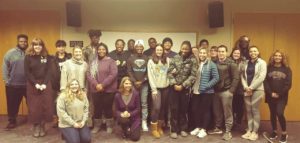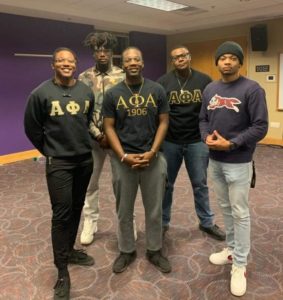
Attendees and discussion leaders from the Indivisible not Invisible event stand together for a photo at the WCU campus in Cullowhee, NC. Photo by Dr. Dana Murray Patterson.
Students and CAPS leaders discussed the mental health of the poor, marginalized and people of color at the Indivisible not Invisible event held Thursday, Jan. 23 at WCU.
Through the discussion and exploration of statistics and personal anecdotes, participants helped alleviate the stigma that surrounds mental health in these communities on campus.
Coordinated by Alpha Phi Alpha, ICA and CAPS, the MLK event was geared toward creating an inclusive space for sharing, learning and educating. Leading the discussion was Dr. Kimberly S. Gorman, Director of CAPS, as well as two psychology doc interns at CAPS, Katherine Beattie and Monica Lawson, with an audience of about 20 students.
Gorman, Beattie and Lawson started the discussion by stating their multiple identities, such as their gender, orientation and role at WCU, and how these identities come into play when talking about privilege and mental health. From there, each leader went on to talk about different elements that relate to mental health in our society today, with students responding and relating their own experiences. Beattie discussed five sociocultural institutions that create our society and culture, as well as influence mental health: family, religion, government, education, and media.
“Particularly with student populations in college, one of the biggest challenges can be when they come in for therapy and they’re starting to develop some conflict around how they were raised, in terms of sociocultural institutions. For a lot of students, this is the first time they’ve been able to explore things like different religions on their own or getting to know people who are different from them,” Beattie said.
E’Quince Smith, the Alpha Phi Alpha Chair for MLK week, who mentioned that Martin Luther King, Jr. was also an Alpha Phi Alpha member, spoke of the stigma surrounding mental health.

Members from Alpha Phi Alpha at the Indivisible not Invisible event at WCU, Cullowhee, NC. Photo by Samantha Lughart.
“I think the stigma definitely has a lot to do with it and a lot of the students don’t feel like they need to focus on their mental health, or they don’t focus on it in the right ways that are healthy for them or beneficial to them. Sometimes, somebody could really be going through something, but they feel like they can deal with it by themselves, but sometimes you do need the extra help.”
Smith helped organize the event in the hopes that the discussion will help others recognize their own mental health needs and bring about more awareness on the topic of mental health in people of color communities.
Research from Mental Health America shows that due to factors such as stigmas, sociocultural institutions, financial situations and other influences, African-Americans and other people of color are more likely to experience mental issues, yet less likely to receive the help they need. In 2011, adult African-Americans were 20% more likely to report serious psychological stress than adult whites in America. Even so, 54.3% of adult African-Americans received treatment for a major depressive episode, compared to 73.1% of adult white Americans. On the other side of mental health treatment, less than 2% of American Psychologist Association members are African-American, making it difficult for African-Americans to find a therapist or other mental health service member who is of the same race as them.
During the Indivisible not Invisible event, a YouTube video by Comedy Central comedian Trevor Noah was played, showing a comical yet sincere depiction of mental health stigmas in African-American communities, addressing external as well as internal issues that help to encourage the stigma.
Through the joint efforts of CAPS, ICA and Alpha Phi Alpha, as well as the students that attended the event, everyone who participated the Indivisible not Invisible event was presented with a new perspective on the stigmas that surround mental health and left with a better understanding of the unknown struggles that many people in the campus community face.


